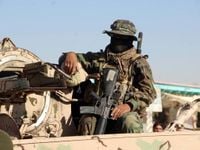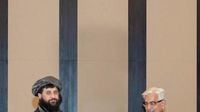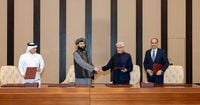After more than a week of deadly clashes that left dozens dead and hundreds wounded, Afghanistan and Pakistan have agreed to an immediate ceasefire, pledging to halt hostilities and work toward lasting peace along their disputed border. The breakthrough, announced on October 19, 2025, followed marathon negotiations in Doha, Qatar, and was brokered with the crucial mediation of both Qatar and Turkey, according to statements from both governments and coverage by the Associated Press, Al Jazeera, and BBC.
The violence that erupted on October 11, 2025, marked the worst fighting between the two countries since the Taliban reclaimed power in Afghanistan in 2021. Skirmishes flared at multiple points along their 2,600-kilometer (1,600-mile) border—known as the Durand Line—after Pakistan reportedly carried out strikes in Kabul and the southeastern Afghan province of Paktika. Islamabad claimed these attacks targeted armed groups linked to cross-border violence inside Pakistan, including the Tehrik-i-Taliban Pakistan (TTP), a group responsible for hundreds of attacks in the past year alone.
For ordinary people on both sides of the border, the fighting was more than just a diplomatic spat; it was a disaster. Thousands of civilians and vehicles found themselves stranded at border crossings like Chaman and Torkham, with the latter completely closed and the former open only for Afghan refugees leaving Pakistan as part of a nationwide crackdown on undocumented foreigners. Shafiullah Khan, an Afghan refugee stuck at Chaman for three days, told the Associated Press, "We are so happy for this peace agreement. The refugees were suffering a lot, but now, after this agreement, we are happy and are going back to our country."
Businesspeople, however, remained anxious. Hazarat Bilal Umaid, whose livelihood depends on cross-border trade, voiced the concerns of many: "People were afraid and worried about how to save their livelihoods. Now our request to both governments is to open the gate for trade as soon as possible."
The ceasefire agreement, as outlined by Taliban government spokesperson Zabihullah Mujahid, commits both nations to refrain from hostile actions and from supporting any groups carrying out attacks against the other. "It has been decided that neither country will undertake any hostile actions against the other, nor will they support groups carrying out attacks against Pakistan. Both sides will refrain from targeting each other’s security forces, civilians or critical infrastructure," Mujahid stated, according to the Associated Press and Al Jazeera. He further emphasized, "Both sides reaffirm their commitment to peace, mutual respect, and the maintenance of strong and constructive neighbourly relations. Both sides are committed to resolving issues and disputes through dialogue."
Pakistan’s Defense Minister Khawaja Asif echoed these sentiments, posting on X (formerly Twitter): "Cross-border terrorism from Afghan territory will cease immediately. Both countries will respect each other’s sovereignty and territorial integrity." He confirmed that a follow-up meeting between Pakistani and Afghan delegations is scheduled for October 25 in Istanbul, Turkey, to hammer out the details and sustainability of the truce.
The Doha talks, which lasted 13 hours, were described as arduous but ultimately fruitful. Pakistan’s Deputy Prime Minister and Foreign Minister Ishaq Dar called the truce "the first step in the right direction." He added, "We look forward to the establishment of a concrete and verifiable monitoring mechanism, in the next meeting to be hosted by Turkey, to address the menace of terrorism emanating from Afghan soil towards Pakistan. It is important to put all efforts in place to prevent any further loss of lives." Both sides publicly thanked Qatar and Turkey for their diplomatic efforts in facilitating the ceasefire.
Despite the agreement, the border remains tense. The Durand Line, drawn by the British in 1893, has never been recognized by Afghanistan and continues to be a source of friction. The two countries have only two main trade routes, and worsening security has forced many locals to abandon their homes. The United Nations Assistance Mission in Afghanistan reported at least 17 Afghan civilian deaths and hundreds more wounded during the recent clashes, with both sides claiming to have inflicted heavy casualties.
The roots of the crisis run deep. Pakistan has long accused the Taliban of providing sanctuary to armed groups like the TTP and the Balochistan Liberation Army (BLA), both of which have carried out deadly attacks in Pakistan’s border provinces. The Center for Research and Security Studies (CRSS), an Islamabad-based think tank, recorded at least 2,414 deaths in these regions during the first three quarters of 2025 alone. Violence attributed to the TTP surged by 46% compared to the previous year, with more than 600 attacks on Pakistani forces in the last twelve months, according to the Armed Conflict Location & Event Data Project.
Afghanistan’s Taliban government firmly rejects these accusations. Mujahid reiterated that the Afghan government’s "consistent stance" is that "Afghan soil will not be allowed to be used against any other country." He insisted, "It does not support any attack against anyone and has always emphasised this stance." Still, Pakistan remains wary, seeking assurances that anti-Pakistan networks will not be allowed to regroup or expand within Afghanistan’s porous borderlands.
Historically, the relationship between Islamabad and the Taliban has been fraught with both cooperation and distrust. Pakistan was a major backer of the Taliban after its ouster in 2001, but ties have soured since the group’s return to power. Efforts at dialogue have had mixed results. In 2021, Pakistan’s then-prime minister Imran Khan pushed for talks with the TTP, mediated by the Taliban, but violence surged after the TTP walked out of a ceasefire deal in 2022. The TTP, founded in 2007, has been responsible for thousands of deaths, including the notorious 2014 attack on the Army Public School in Peshawar that killed more than 130 students. The group remains banned in Pakistan and is designated a terrorist organization by the United States.
With so much blood spilled and trust in short supply, observers are cautious about the prospects for lasting peace. Abdullah Baheer, a political analyst in Kabul, told Al Jazeera, "There are no winners in war. There are only losers. This logic of bombing Afghanistan into submission didn’t work for the United States for 20 years of their occupation. Why do we think it will work now?"
As diplomats prepare for the next round of talks in Istanbul, the world will be watching to see if Afghanistan and Pakistan can turn this fragile ceasefire into a foundation for genuine stability—or if, once again, the cycle of violence will resume along one of the world’s most volatile borders.



